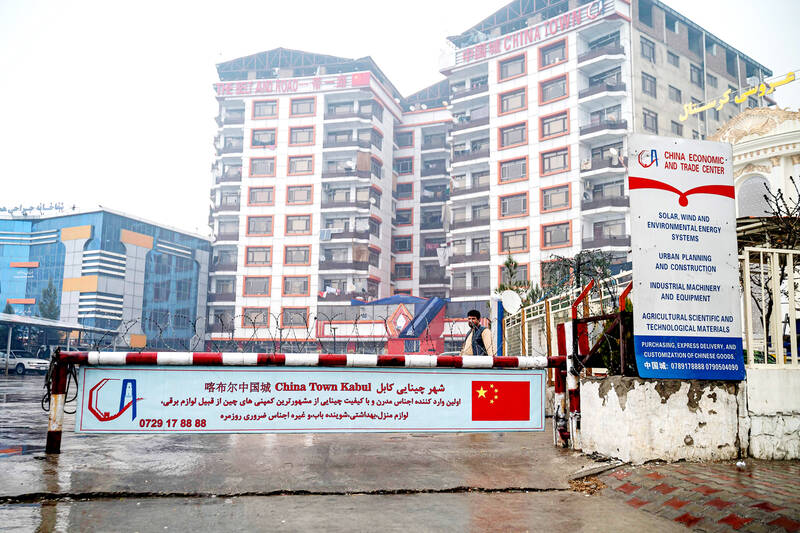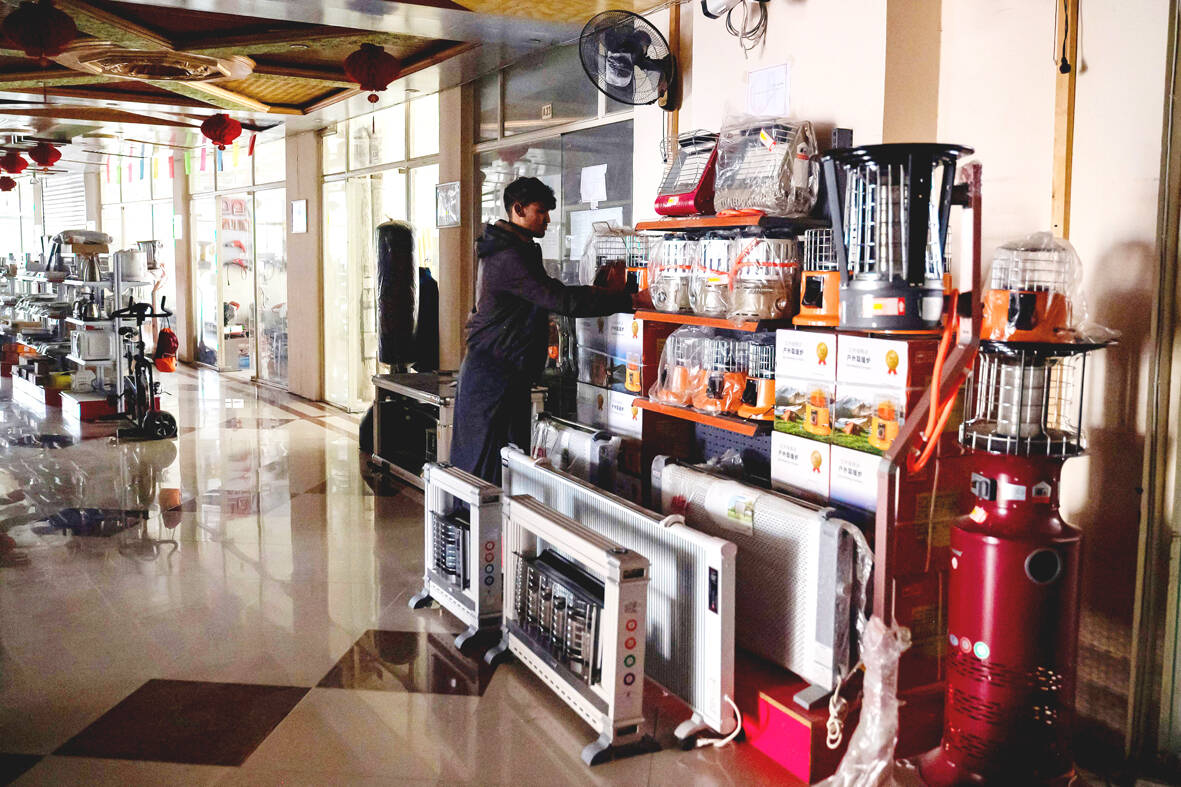While most of the world treats Afghanistan’s Taliban government as a pariah, China is growing diplomatic and economic links — and Kabul is happy for the attention.
Top-level meetings between officials, new mineral deals, and the upgrading of transport routes between the two countries are regularly championed by Taliban government officials.
While Beijing has played down the formality of these growing links, it is steadily increasing investment and exposure — a relationship that could benefit both parties, analysts and diplomats say.

Photo: AFP
“The Islamic Emirate of Afghanistan is a challenging terrain, but the characteristic of the Chinese is to go where no one else goes, trying to gain advantages,” said Valerie Niquet, an analyst with the Foundation for Strategic Research in Paris.
“The Chinese are extending a hand to the Afghans, who need all possible assistance.”
In September China became the first country to appoint a new ambassador to Kabul, and on Tuesday the Taliban government’s envoy to Beijing — along with dozens of other diplomats — presented his credentials to Chinese President Xi Jinping (習近平).

Photo: AFP
“I believe that when the concerns of all parties will be more vigorously addressed, diplomatic recognition of the Afghan government will follow naturally,” said Wang Wenbin (汪文斌), China’s foreign ministry spokeswoman.
Last month China joined Russia in abstaining on a UN Security Council vote calling for the appointment of a special envoy to Afghanistan — something strongly opposed by the Taliban authorities.
The expectations of the international community include allowing girls and women to be educated, letting them to work, introducing a more inclusive government, and greater protection for minorities.
But China’s approach — exchanging ambassadors without official recognition — allows Beijing to maintain relations while also not breaking ranks with the rest of the world.
“Fundamentally, China doesn’t care about women’s rights; if its interest is to get closer to the Taliban regime, it won’t impose conditions,” Niquet said.
In turn, Taliban authorities have said nothing about the alleged mistreatment and rights abuses suffered by Muslim Uyghurs in China’s Xinjiang region bordering Afghanistan.
NATURAL RESOURCES
The prize in all this is access to Afghanistan’s wealth of untapped mineral resources — as well as a market for Chinese goods.
“The vast natural resources of Afghanistan, such as copper, lithium or rare earths, have significant economic potential for China,” said Jalal Bazwan, assistant professor of political science at Kardan University in Kabul.
Immediately after his installation in December as Afghanistan’s ambassador to Beijing, Bilal Karimi held discussions with the Chinese state-owned company MCC on Mes Aynak, the world’s second-largest copper deposit, some 40km from the capital Kabul.
MCC obtained exploitation rights in 2008 — worth some US$3.5 billion — but the project was paralyzed by war and insecurity.
The discovery of Buddhist archaeological remains at the site further complicated development.
“These historical assets are a cultural treasure for Afghanistan, part of its identity,” says Hamayoon Afghan, spokesman for the ministry of mines — an about-face from the Taliban’s previous incarnation, which 23 years ago stunned the world by destroying the Bamiyan Buddhas, deeming them un-Islamic.
Thirsty for hydrocarbons, China is also interested in the potential of Afghan oil.
Since the renegotiation in January last year of an old contract in the northwestern Amu Basin, Sino-Afghan extraction has begun in 18 wells, says the mines ministry. Afghan authorities have also announced plans by Chinese companies to invest half a billion dollars in solar energy in the country.
NEW SILK ROAD
A 300-kilometer road under construction will connect Badakhshan to the Chinese border, according to Ashraf Haqshanas, spokesman for the ministry of public works.
The two countries share a border just 76 kilometers long, but this new link will significantly boost trade, currently a modest US$1.5 billion per year.
Despite its largesse, the security of its investments remains crucial for China.
A deadly Islamic State group attack in December 2022 on a Kabul hotel housing Chinese nationals group shocked Beijing, which urged Taliban authorities to improve security. During the Taliban’s first stint in power from 1996-2001, they hosted hundreds of Uighur militants from China — the US detained 22 of them for years in Guantanamo Bay — and Beijing is wary of any new threat from the group.
“In 2021, there were reports of Uighur militants being forcefully evacuated from border regions near China-Afghanistan,” said Bazwan. “The Taliban have assured China that they will prevent Afghan soil from being used for terrorist attacks against its neighbors,” he added, although neighbor Pakistan insists Kabul has not kept its promises on this.
As part of its rapprochement, Beijing is also exercising its “soft power” by delivering humanitarian aid — in particular following recent deadly earthquakes.
In Kabul, there is even a modest “Chinatown” — two eight-story buildings where cheap Chinese products are sold.
“Belt and Road” is written in red Chinese calligraphy at the top of the building, referring to the massive infrastructure project linking China to Central Asia and the rest of the world.
Afghanistan could also be integrated into the China-Pakistan Economic Corridor — the cornerstone of the project — leading to the port of Gwadar, a strategic outlet for China on the Arabian Sea in Pakistan’s south.
“The strategic position of Afghanistan along the Belt and Road initiative makes it an attractive partner,” said Bazwan.

A vaccine to fight dementia? It turns out there may already be one — shots that prevent painful shingles also appear to protect aging brains. A new study found shingles vaccination cut older adults’ risk of developing dementia over the next seven years by 20 percent. The research, published Wednesday in the journal Nature, is part of growing understanding about how many factors influence brain health as we age — and what we can do about it. “It’s a very robust finding,” said lead researcher Pascal Geldsetzer of Stanford University. And “women seem to benefit more,” important as they’re at higher risk of

March 31 to April 6 On May 13, 1950, National Taiwan University Hospital otolaryngologist Su You-peng (蘇友鵬) was summoned to the director’s office. He thought someone had complained about him practicing the violin at night, but when he entered the room, he knew something was terribly wrong. He saw several burly men who appeared to be government secret agents, and three other resident doctors: internist Hsu Chiang (許強), dermatologist Hu Pao-chen (胡寶珍) and ophthalmologist Hu Hsin-lin (胡鑫麟). They were handcuffed, herded onto two jeeps and taken to the Secrecy Bureau (保密局) for questioning. Su was still in his doctor’s robes at

Last week the Democratic Progressive Party (DPP) said that the budget cuts voted for by the China-aligned parties in the legislature, are intended to force the DPP to hike electricity rates. The public would then blame it for the rate hike. It’s fairly clear that the first part of that is correct. Slashing the budget of state-run Taiwan Power Co (Taipower, 台電) is a move intended to cause discontent with the DPP when electricity rates go up. Taipower’s debt, NT$422.9 billion (US$12.78 billion), is one of the numerous permanent crises created by the nation’s construction-industrial state and the developmentalist mentality it

Experts say that the devastating earthquake in Myanmar on Friday was likely the strongest to hit the country in decades, with disaster modeling suggesting thousands could be dead. Automatic assessments from the US Geological Survey (USGS) said the shallow 7.7-magnitude quake northwest of the central Myanmar city of Sagaing triggered a red alert for shaking-related fatalities and economic losses. “High casualties and extensive damage are probable and the disaster is likely widespread,” it said, locating the epicentre near the central Myanmar city of Mandalay, home to more than a million people. Myanmar’s ruling junta said on Saturday morning that the number killed had